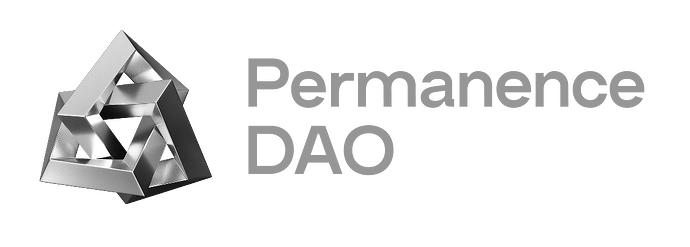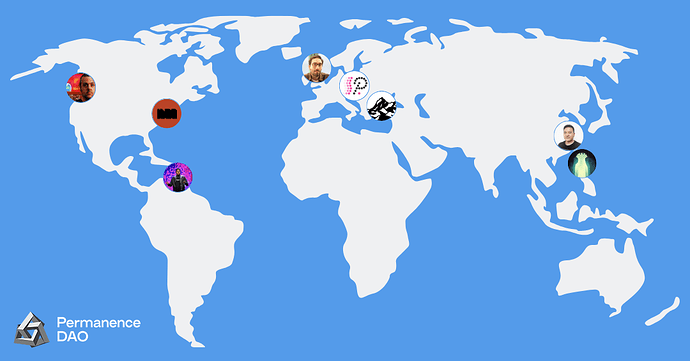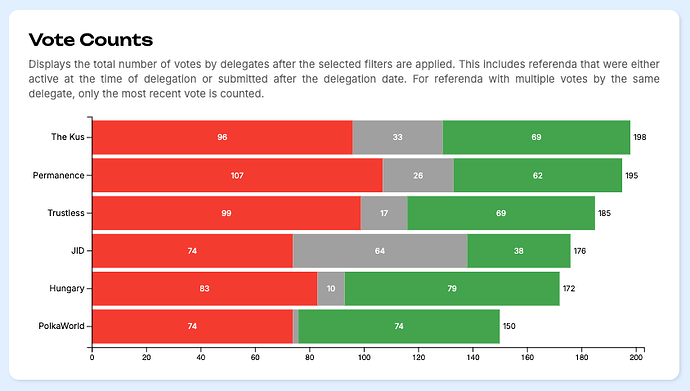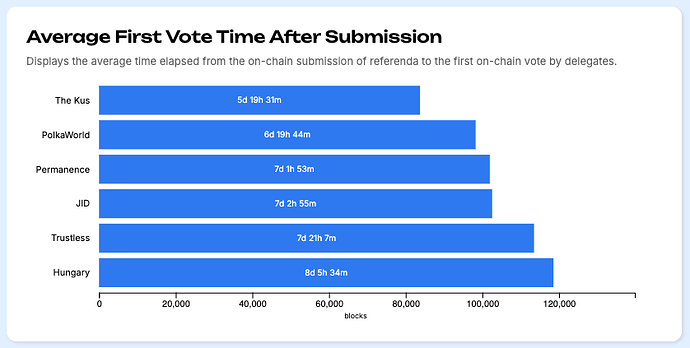1. Introduction
Permanence DAO (X, Web, Docs, Bluesky) is a global multi-disciplinary collective of incorporated and individual contributors active in Polkadot. Founded on 29 September 2024 and committed to the success of the network, we focus on value-driven decision-making, efficiency in spending, creative new uses of the Polkadot tech stack, innovative governance models, and driving adoption across sectors.
Leveraging our unique voting system and policies, diverse member base, and evidence-based decision-making processes supported by custom-built governance tools, we aim to deliver the highest levels of transparency, participation, and quality of feedback among governance actors in Polkadot.
2. Delegation
Permanence DAO operates a two-tiered delegation system, using separate accounts for Decentralized Voices (DV) delegations and member/external delegations to comply with its conflict of interest policy. The group currently has approximately 300K DOT delegated to its HQ account (15u...KDV) on Polkadot, and approximately 4K KSM on Kusama (Eic...r9W).
The DV delegation addresses are:
Polkadot DV Delegation Address:
14ZaBmSkr6JWf4fUDHbApqHBvbeeAEBSAARxgzXHcSruLELJ
Kusama DV Delegation Address:
ELCdsyWFNC7twEeBcQvdpCmpJhGBgiVeWtaKqRqXGn5ATiA
The diagram above illustrates this delegation structure on Polkadot, showing how members and external delegators route their delegations through the HQ account, while DV delegations are managed by a separate account to ensure compliance with our conflict of interest policy.
3. Members
Current members of Permanence DAO are:
1. Helikon Labs – Istanbul, Turkey (X | Web)
2. Polkadot Music Events Initiative (PMEI) – New York, USA (X)
3. The Ionian (Beckett) – Newcastle, UK
4. Polkadotters – Brno, Czech Republic (X | Web)
5. EzioRed – Caracas, Venezuela (X)
6. José Rabasso – Vancouver, Canada (X)
7. William (W1ZSPR3) – Taipei, Taiwan (X)
8. Yongfeng Li (OpenSquare) – Hangzhou, China (X)
More detailed background on each member can be found in the Foundation Document. Visit our documentation site to access the Code of Conduct, Membership Mandate, and other key documents.
3.1. Geographical Distribution
Permanence DAO is represented by its members in 8 cities, across 8 countries and 4 continents. This diverse regional distribution gives the DAO an advantage in evaluating region-specific proposals and provides an inclusive global perspective.
3.2. Professional Distribution
Permanence DAO members are active across a broad range of industries and fields, as listed below.
- Development: Helikon, Yongfeng Li (OpenSquare)
- Infrastructure: Helikon, Polkadotters
- Business Development (BD): PMEI, William
- Media: PMEI, Polkadotters
- Community: José Rabasso, EzioRed
- Legal: EzioRed
- Entertainment: PMEI
- Academia: The Ionian
This professional diversity gives the group a unique edge in evaluating treasury proposals from a range of disciplinary perspectives.
4. DV Cohort IV Performance
As of 3 August 2025, Permanence DAO has voted on 195 referenda across the DV-delegated tracks in Cohort IV of the program. We are currently the second-most active voter among all DV Cohort IV delegates, as illustrated below:
We also actively vote on non-DV tracks. Including these, we have voted on a total of 231 referenda to date.
We provide feedback for all of our votes, except where it is not necessary, such as withdrawn proposals, non-controversial runtime upgrades, or small tip requests submitted by the Parity Tip Bot.
As illustrated above, on average, Permanence DAO submitted its first vote approximately 7 days after proposal submission.
4.1. Office Hours
We offer proposers two 30-minute slots every Wednesday and Thursday. These sessions are consistently booked in advance, and provide us with opportunities to better understand the proposers and their offerings.
To date, Permanence DAO has held over 50 office hour calls with proposers.
4.2. DAO Voting Statistics
Members of Permanence DAO demonstrate exceptional levels of participation and feedback. Below is a summary of monthly participation and feedback rates since April 2025, when the DV delegations became active.
![]() Force-votes are submitted for proposals posted by the Parity Tip Bot, as well as for whitelisted, malicious, or withdrawn proposals.
Force-votes are submitted for proposals posted by the Parity Tip Bot, as well as for whitelisted, malicious, or withdrawn proposals.
Polkadot
On Polkadot, the average monthly member participation rate is 90.5%, and the feedback rate is 85.7% over the past four months.
July 2025
✅ 61 on-chain votes
🛠 36 member-voted
🤖 25 force-voted
🗳 318 off-chain member votes
📝 302 feedback submissions
📈 88% average member participation (-3% vs. Jun)
💬 83% average member feedback rate (-3% vs. Jun)
June 2025
✅ 49 on-chain votes
🛠 32 member-voted
🤖 17 force-voted
🗳 292 off-chain member votes
📝 278 feedback submissions
📈 91% average member participation (-2% vs. May)
💬 86% average member feedback rate (-3% vs. May)
May 2025
✅ 45 on-chain votes
🛠 31 member-voted
🤖 14 force-voted
🗳 289 off-chain member votes
📝 277 feedback submissions
📈 93% average member participation (+3% vs. Apr)
💬 89% average member feedback rate (+4% vs. Apr)
April 2025
✅ 34 on-chain votes
🛠 27 member-voted
🤖 7 force-voted
🗳 242 off-chain member votes
📝 229 feedback submissions
📈 90% average member participation
💬 85% average member feedback rate
Kusama
On Kusama, the average monthly member participation rate is 88.2%, and the feedback rate is 73.5% over the past four months.
July 2025
✅ 21 on-chain votes
🛠 13 member-voted
🤖 8 force-voted
🗳 113 off-chain member votes
📝 107 feedback submissions
📈 86% average member participation (-1% vs. Jun)
💬 82% average member feedback rate (+5% vs. Jun)
June 2025
✅ 16 on-chain votes
🛠 11 member-voted
🤖 5 force-voted
🗳 96 off-chain member votes
📝 85 feedback submissions
📈 87% average member participation (+2% vs. May)
💬 77% average member feedback rate (+27% vs. May)
May 2025
✅ 9 on-chain votes
🛠 5 member-voted
🤖 4 force-voted
🗳 43 off-chain member votes
📝 25 feedback submissions
📈 85% average member participation (-10% vs. Apr)
💬 50% average member feedback rate (-35% vs. Apr)
April 2025
✅ 9 on-chain votes
🛠 8 member-voted
🤖 1 force-voted
🗳 76 off-chain member votes
📝 68 feedback submissions
📈 95% average member participation
💬 85% average member feedback rate
5. Voting Philosophy, Policy, and Infrastructure
5.1. Voting Philosophy
Permanence DAO evaluates treasury proposals on a case-by-case basis. By leveraging the diverse expertise, backgrounds, and perspectives of its members from a broad range of fields, the DAO aims to arrive at solid and fair evaluations of proposals.
Each core member holds equal voting power, and has full autonomy in governance decisions while adhering to the DAO’s core values for guidance:
1. Integrity: We preserve our integrity through a strong commitment to our values, cultivating stability and reliability.
2. Transparency: We promote accountability and trust by focusing on transparency in our direction, decision-making, and resource management.
3. Neutrality: We are unbiased in our decision-making, evaluating opportunities primarily based on the network’s well-being and long-term interests.
4. Merit: We seek merit and a proven track record in the teams and individuals we support or work with, incentivizing competence.
5. Sustainability: We acknowledge the unique value offered by the networks we operate in, and we work to sustain and enhance this value for the long term.
6. Creativity: We promote an environment where a multidisciplinary creative energy of arts, crafts, and technology flows freely and comes to fruition.
7. Openness: We remain flexible and open-minded, aiming for exploration through experimentation. We embrace criticism and challenge our assumptions.
5.2. Conflict of Interest Policy
We announced our conflict of interest policy following the announcement of our DV Cohort IV delegation on 27 March 2025. The policy, as published on the Permanence DAO X account, is as follows:
As part of its conflict of interest policy, Permanence DAO will abstain from using the voting power granted through the DV delegation on any proposal that directly or indirectly benefits any of its members.
While direct benefit includes the cases where a member is the proponent of a proposal, indirect benefit occurs when a member has a financial affiliation with the proposing organization, has a partnership with a beneficiary, or holds a stakeholder position in a beneficiary.
This policy was later refined and formalized through the internal referendum PDAO-004.
Permanence DAO remains the only group among the DV delegates that enforces this level of separation of concerns.
Below are examples of proposals on which our DV delegation cast an abstain vote on-chain due to conflicts of interest:
- KSM#556 Kusama System Parachains Collator Bounty Top-Up
- DOT#1504 PolkaBiz Business Mentorship & Ecosystem Support
- DOT#1517 Guestlist+1: Polkadot becomes the Center of Gravity for Blockchain x Music
- DOT#1544 PolkaBiz Retroactive Treasury Request (January–April 2025)
- DOT#1589 dAppForge Milestone 4
- DOT#1593 WAGOI
- DOT#1612 Subsquare New Batch of Features Development and Maintenance
- DOT#1651 Polkadot System Parachains Collator Bounty Top-Up
- DOT#1662 UX Bounty - Q3 2025 Refill
5.3. Per-Track Voting Policy
Permanence DAO applies a per-track voting policy, allowing us to enforce stricter requirements for critical tracks such as Root, Whitelisted Caller, Referendum Canceller, and Big Spender.
Our voting system is governed by three key parameters, encouraging high participation and in-depth internal discussion before any vote is cast. These parameters are:
- Participation: The vote defaults to abstain until the participation requirement is met. If no participation requirement is defined, the vote for the track defaults to nay.
- Quorum: The percentage of aye votes relative to the total number of DAO members. For example, a 60% quorum requirement means that the vote remains nay unless at least 60% of all members vote aye.
- Majority: The percentage of aye votes relative to the total number of non-abstain votes.
Based on these parameters, our voting policy is defined for various OpenGov tracks as follows:
| Track | Participation (≥) | Quorum (≥) | Majority (>) |
|---|---|---|---|
| Small Tipper | 30% | - | 50% |
| Big Tipper | 35% | - | 50% |
| Small Spender | 50% | - | 50% |
| Medium Spender | - | 50% | 50% |
| Big Spender | - | 60% | - |
| Treasurer | - | 60% | - |
| Wish for Change | - | 60% | - |
All other tracks (Root, Whitelisted Caller, Staking Admin, General Admin, etc.) follow the same ≥60% quorum policy used for the Big Spender, Treasurer, and Wish for Change tracks.
Additionally, if 60% or more of all members vote to abstain, the DAO’s vote is cast as abstain.
Our voting policy remains a work in progress, subject to continuous refinement through observation and iteration.
5.4. Voting Infrastructure
Our voting system is powered by a custom-built, open-source governance infrastructure.
All internal referenda are recorded in our OpenSquare Space, ensuring full transparency of members’ votes and feedback. Each referendum is openly accessible through the OpenSquare API for historical and analytical purposes.
5.4.1. Operation Details
A detailed breakdown of our voting process and timeline is as follows:
- A new relay chain referendum is created.
- The bot fetches the referendum details and creates a matching internal referendum in our OpenSquare space.
- The bot posts a discussion topic in our Telegram group.
- Members review and discuss the proposal. In some cases, we also hold an office hour call with the proposer.
- Members submit their signed votes on the internal referendum alongside their feedback.
- A voting admin triggers the bot to submit the on-chain vote.
- The bot evaluates the outcome of the referendum against the voting policy for the specific track.
- The bot submits the on-chain vote accordingly.
- The bot collects all member feedback and generates a summary using the OpenAI API.
- The bot submits the final outcome and collective feedback through the Subsquare API.
6. Other Activities and Contributions
6.1. Validators
Permanence DAO operates one Polkadot validator (Asimov) and one Kusama validator (Lovelace) as part of Cohort 2.1 of Web3 Foundation’s Decentralized Nodes program. The DAO has also applied for the third cohort of the program.
Both validators run on high-performance server infrastructure connected to high-bandwidth networks. As shown above, our validators demonstrate very high reliability and performance, with very few missed paravalidation votes.
6.2. RPC Infrastructure
Permanence DAO has been providing RPC services for Polkadot and Westend Asset Hub since the announcement made on 6 February 2025, with servers located in the EU and plans for future expansion.
7. Income and Spending
The DAO’s sole source of income is its Polkadot and Kusama validators, which are enrolled in the W3F Decentralized Nodes Program.
Between April and July 2025, the DAO has earned 5,969 DOT and 62 KSM, of which approximately 4,425 DOT has been spent, as detailed below.
| Activity | Total Spend (DOT) |
|---|---|
| Member Compensation | 1,414.00 |
| Infrastructure & Development | 914.92 |
| Media Production | 684.95 |
| Member Self-Stake Compensation | 600.00 |
| Branding & Design | 512.63 |
| Development | 163.27 |
| Social Media Management | 135.23 |
| TOTAL | 4,425.00 |
8. Vision for the Future
Permanence DAO continues to pursue its founding vision of becoming an OpenGov L2, where novel on-chain governance models are explored and implemented, and progressive ideas are shaped through both internal collaboration and engagement with the broader community.
Building on our first ten months of active experimentation and practice, we are driven to set new standards for on-chain governance, building the narrative, infrastructure, and processes needed to support the evolving needs of network states and their communities.
9. DV Cohort V Targets
Building on our momentum from Cohort IV, Permanence DAO aims to expand its contributions to OpenGov in the coming term. Our targets for Cohort V include:
 Sustained Strong Participation: Maintain ≥85% member participation and ≥80% feedback rates on both Polkadot and Kusama.
Sustained Strong Participation: Maintain ≥85% member participation and ≥80% feedback rates on both Polkadot and Kusama. Voting Policy Refinement: Continue evaluating and iterating on our per-track voting policy to alleviate inefficiencies and improve agility and responsiveness, without compromising on rigor.
Voting Policy Refinement: Continue evaluating and iterating on our per-track voting policy to alleviate inefficiencies and improve agility and responsiveness, without compromising on rigor. Expand Office Hours: Increase office hour capacity to six 30-minute slots per week to meet proposer demand. Develop incentive mechanisms to support sustained member engagement.
Expand Office Hours: Increase office hour capacity to six 30-minute slots per week to meet proposer demand. Develop incentive mechanisms to support sustained member engagement. Proactive Ecosystem Involvement: More focus on dialogue, publications, and thought work across the ecosystem.
Proactive Ecosystem Involvement: More focus on dialogue, publications, and thought work across the ecosystem. Launch Parachain: Establish on-chain governance, and initiate on-chain treasury.
Launch Parachain: Establish on-chain governance, and initiate on-chain treasury. Expand Infrastructure Services: Extend RPC infrastructure to additional regions, and explore opportunities beyond RPC.
Expand Infrastructure Services: Extend RPC infrastructure to additional regions, and explore opportunities beyond RPC. Grow Validator Operations: Strengthen validator operations, and explore collator services for parachains.
Grow Validator Operations: Strengthen validator operations, and explore collator services for parachains.
10. Conclusion
Since its founding in late September 2024, Permanence DAO has become a major contributor across multiple fields within the Polkadot ecosystem, and a very active delegate throughout Decentralized Voices Cohort IV over the past four months.
With its multi-disciplinary, highly engaged, and capable member base, as well as its strong due diligence practices and unique governance model, the DAO is fully prepared to continue serving as a delegate for the Decentralized Voices Cohort V.










